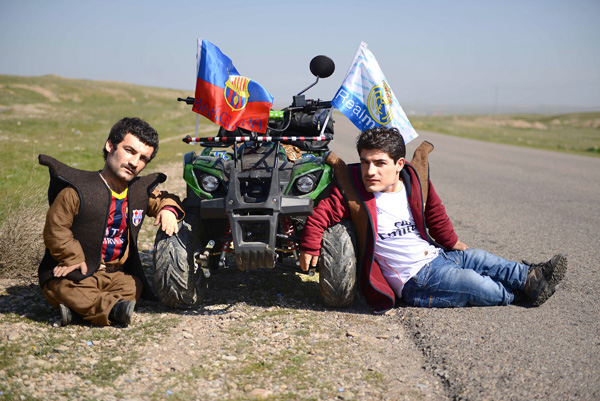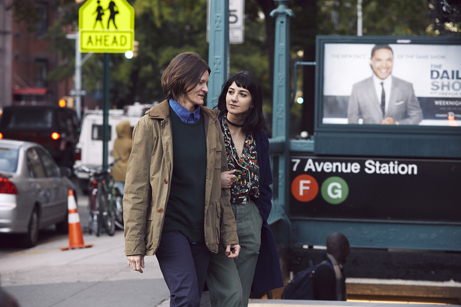Remember Fargo, the kooky, sinister caper comedy that made a big splash about 20 years back and inspired the FX TV series? The spirit of the Coen Brothers’ (arguably) best movie hovers over narrative entries in the Tribeca Film Festival, with the director of this year’s Mother even citing the film as a direct influence. Stories teem with eccentrics, killers, and cultists who haunt the landscape.
Mother
A motionless young man in a coma lies at the center of this black comedy that unfolds in a modest home in Estonia. Someone in a small town shot bright, promising Lauri—why? Pinched and taciturn Elsa (Tiina Mälberg) is saddled with the care of her son, and she’s barely acknowledged by her surly husband, who seems more of a combination boarder and stranger than a spouse.
She also has to deal with the parade of Lauri’s visitors coming by the house on unscheduled visits—love interests, a suicidal pal, a hard-drinking doctor, and a dodgy businessman—all with their own reasons for hanging around the body and nosing through his belongings. A farcical but touching love affair, desperation over money, and the looming presence of a dogged, chubby policeman contribute to Mother’s distinctly Fargo-esque atmosphere of offbeat northern chill.
The slow pace and repetitive scenes will mesmerize those in tune with the movie’s energy; others will fidget. There’s a fine line between bone-dry and dry as dust, and Mother sometimes crosses to the wrong side. Yet Mother is very meticulously thought-out and realized, a hermetic world unto itself. Director Kadri Kõusaar has tight control over her material. Handsome cinematography suffused with natural light serves as a counterweight to the darkness at the film’s heart.
The Fixer
Translator and facilitator Osman guided an American correspondent through the Afghan war. Now granted asylum in the United States, Osman (Dominic Rains) winds up living at the Northern California woodland home of the reporter’s mother, in another Fargonian touch, a gruff, kind-hearted cop (Melissa Leo). This handsome, gentle young man, at loose ends and looking for something to do, flirts with an elusive young local actress (Rachel Brosnahan), strikes up a friendship with local ne’er-do-well Lindsay (James Franco, manically channeling a sort of gonzo David Lee Roth), and falls afoul of the area’s cult charlatans and criminals in a series of increasingly dangerous encounters. The story’s shaggy Fargo vibe darkens with Twin Peaks mystery and touches of Boogie Nights decadence before tailing off into a downbeat ending.
Rains’s acting can seem vague and under-directed, and the movie infantilizes Osman and provides him with unconvincing motives: Osman is too naïve for a veteran of a war zone, and it’s hard to understand his connection to the yammering, drugged-out Lindsay. However, this idiosyncratic film takes unpredictable turns. Some feel random, some beguiling. A number of standout scenes crackle with energy and risk, and dialogue cleverly satirizes passive-aggressive California New Age scene. Melissa Leo brings pro acting chops and nuance to a part that could lapse into cartoonishness, while Rachel Brosnahan also turns in a smart performance as Osman’s possible love interest. Bleak, poetic conclusion may be unsatisfying, but feels appropriate.
El Clásico
The successful operator of a Kurdish teahouse in Iraq, Alan (Wrya Ahmed) is a little person with soulful eyes, cheekbones like Michelangelo’s David, and a brave heartful of pluck. He has his sights set on a pretty girl in his village and plans to build her the biggest house in town, where they can raise 10 children. Her stern father, though, will not consent to the marriage. So lovelorn Alan corrals his brother on a perilous overland journey to Madrid aboard a ramshackle dirt bike to present a specially decorated pair of shoes to soccer star Cristiano Ronaldo and win his future father-in-law’s and Real Madrid fan’s respect. El Clásico’s warm, generous outlook propels the work beyond the flimsiness of its premise, treating us to a gently comic road movie running on fumes and Man of La Mancha spirit. The film addresses serious issues with a disarmingly light touch.
Slapstick, hopeful elements of the plot mix uneasily with harsh details, such as sadistic beatings and organ trafficking. In the context of today’s migrant crisis, scenes of travelers matter-of-factly resorting to fake visas and human trafficking in order to get to the West may raise eyebrows. However, once you become accustomed to the tale’s oddness, it’s fun to go along for the ride. Real-life brothers Wrya and Dana Ahmed deliver winning, unself-conscious performances. We are allowed a glimpse of a culture and people we rarely see, and an ethic of loyalty and tenacity is uplifting.
The Loner
Do you love the ’80s? Then you must rush to The Loner, whose winking pink neon, synth-fart soundtrack, and seedy nightclubs summon film noir but end up evoking Miami Vice without the cheesy fun. Once a child soldier in Iran’s conflict with Iraq, Behrouz (Reza Sixo Safai) is now an opium addict trying to stay out of trouble selling real estate in Los Angeles. He’s bedeviled by low-budget, awkward-looking flashbacks of the war, but that’s nothing compared to the beatings, stabbings, and pompous lectures he’s in for from creeps in LA’s Iranian and Russian underworld.
When a drug deal goes bad, Behrouz, his Russian girlfriend, Oksana (model Helena Mattson), and her son are soon on the run. Guns blaze, and bodies pile up. You’ve got to give credit to The Loner for staying true to its retro origins: vaguely S-M-flavored sex, hissing gay villains (including The Fixer’s Dominic Rains sporting a prissy mustache and Julian Sands made up like Adam Ant), and a drawn-out death/martyrdom scene puff up a sense of self-serious menace undercut by foolishness that feels Reagan-era to a T.
That said, audacity and preposterousness may elevate this pastiche to cult status among film geeks. Leading man Reza Sixo Safai has a tormented Clive Owen-style charisma that proves durably watchable, especially when his lean, alert face is framed MTV-style by the shadows from venetian blinds.
Women Who Kill
Your nosy ex won’t get out of your hair, your pals at the local food co-op are bullying you into taking extra shifts, and your hot new girlfriend just might be a serial killer: What’s a Park Slope dyke to do? This deadpan, lo-fi Women daringly mixes the horror/thriller genre with a wicked comic streak, sending up oh-so-easily-offended lesbians living in a liberal Brooklyn bubble. In its particularity and narrowcast sensibility, the film manages to be very of the moment.
Morgan (director and writer Ingrid Jungermann, melding Sam Shepard with Harriet the Spy) produces a podcast on women serial killers with her bossy former girlfriend, Jean (Ann Carr). Jean and the more recessive Morgan are a bickering odd couple who know each other only too well, and we can feel Morgan’s relief at escaping an old bond when she falls for doe-eyed pixie dream girl Simone (Sheila Vand) at the snooty organic co-op where they work. But Simone’s smoldering good looks conceal something rotten, and an atmosphere of menace envelops the pair’s new romance.
Women Who Kill does not try to knock you out with laughter, but it aims to create a sense of knowing amusement, and that’s just as well. With material like this, a light touch feels right. The horror-comedy combination doesn’t always work, and acting hiccups slow the movie down at times. But daffy yet deceptively sharp dialogue and intriguing shifts in tone make up for those shortcomings. It won a festival prize for best original screenplay, with a cash prize of $2,500. Here’s hoping Jungermann can pull the moolah together for her next project.


















Leave A Comment